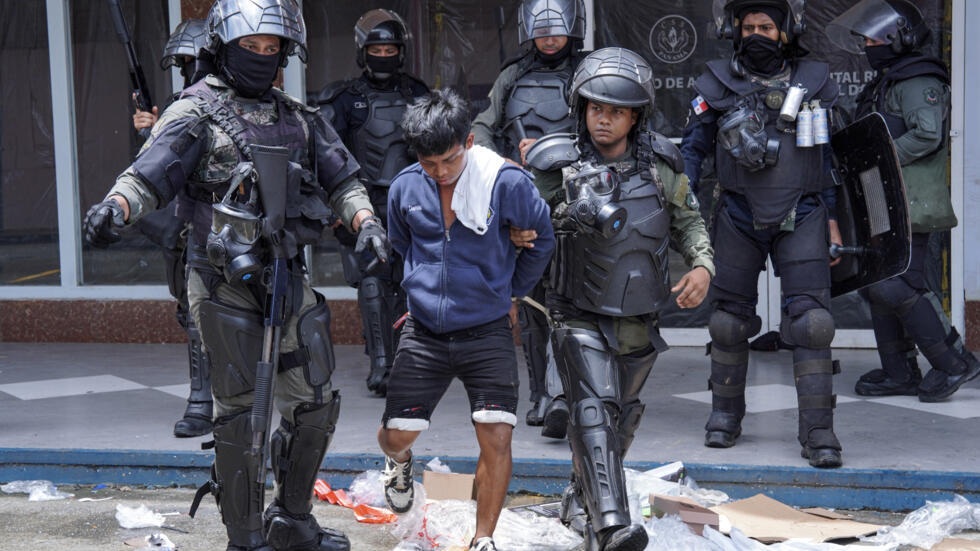Panama’s western Bocas del Toro province has been plunged into turmoil, prompting the national government to declare a state of emergency on Saturday, June 21, 2025, after weeks of escalating protests over a controversial pension reform law.
According to online media sources, the region, known for its banana production, has become the epicenter of violent demonstrations that have led to looting, arson, and direct confrontations with law enforcement.
Tensions that had been simmering for nearly two months boiled over this week in the city of Changuinola, the provincial capital.
Clashes between demonstrators and police turned deadly, with one person losing their life and around 30 more, including several officers, sustaining injuries.
Authorities said on Friday that the situation had deteriorated to a point where extraordinary measures were required to restore public order.
In a nationally televised news conference, Presidential Minister Juan Carlos Orillac announced the government’s decision to temporarily suspend certain constitutional rights.
He also announced the government’s decision to ban all public gatherings in the province for a period of five days.
Orillac justified the move as necessary to “rescue the province from radical groups.”
He also labeled the destruction of public infrastructure, including the partial burning of a stadium, as acts of criminality rather than legitimate protest.
“In the face of systematic violence and the breakdown of public order, the state will enforce its constitutional duty to safeguard peace and stability,” Orillac declared.
The latest wave of unrest stems from widespread discontent with a pension reform law passed in March.
The reform, criticized for slashing benefits and increasing retirement requirements, has triggered national outrage.
In Bocas del Toro, the resistance has been spearheaded by unionized workers and Indigenous communities, with the local workforce from a Chiquita banana plantation at the forefront.
Initially, thousands of Chiquita employees joined the strike, which severely disrupted banana exports and local commerce.
The company denounced the action as “an unjustified abandonment of work” and responded by dismissing a significant number of its workers.
However, negotiations eventually led to a partial reinstatement of the workers’ benefits, prompting them to end their participation in the protests.
Despite their withdrawal, roadblocks and sporadic demonstrations have persisted in the region, with the government indicating that the situation on the ground remains volatile.
Though no longer tied directly to the banana workers, the ongoing unrest has taken on a broader, more chaotic form, driven by anger at the central government.
Thursday marked the peak of the violence.
In Changuinola, groups of hooded demonstrators allegedly set part of the city’s baseball stadium on fire, while police officers were inside.
Businesses were looted, and the local airport was seized by vandals, according to police reports.
Vehicles were stolen from rental agencies, and offices and warehouses, including some holding supplies for Chiquita, were ransacked.
The airport remained closed the following day.
The crisis in Bocas del Toro is not an isolated event. Across Panama, President Jose Raul Mulino has been grappling with a surge in public dissent.
His administration’s controversial decisions have stoked nationwide anger, not only over pension reform but also environmental and geopolitical issues.
In April, Mulino struck a controversial agreement with U.S. President Donald Trump, permitting the deployment of American troops to Panamanian military bases along the Panama Canal.
The deal was framed as a strategic defense move, but critics viewed it as a capitulation to foreign pressure.
This is especially after Trump’s threats to “take back” the vital waterway, originally built by the United States.
Adding fuel to the fire, Mulino also provoked backlash from environmentalists and Indigenous groups by proposing the reopening of Cobre Panama, one of Central America’s largest copper mines.
This is despite ongoing concerns over environmental degradation and community displacement.
With tensions continuing to rise and social unrest spreading beyond Bocas del Toro, the Panamanian government reportedly faces mounting pressure to not only restore order but to address the root causes of national dissatisfaction.
For now, the state of emergency underscores the fragile stability of a nation on edge.







